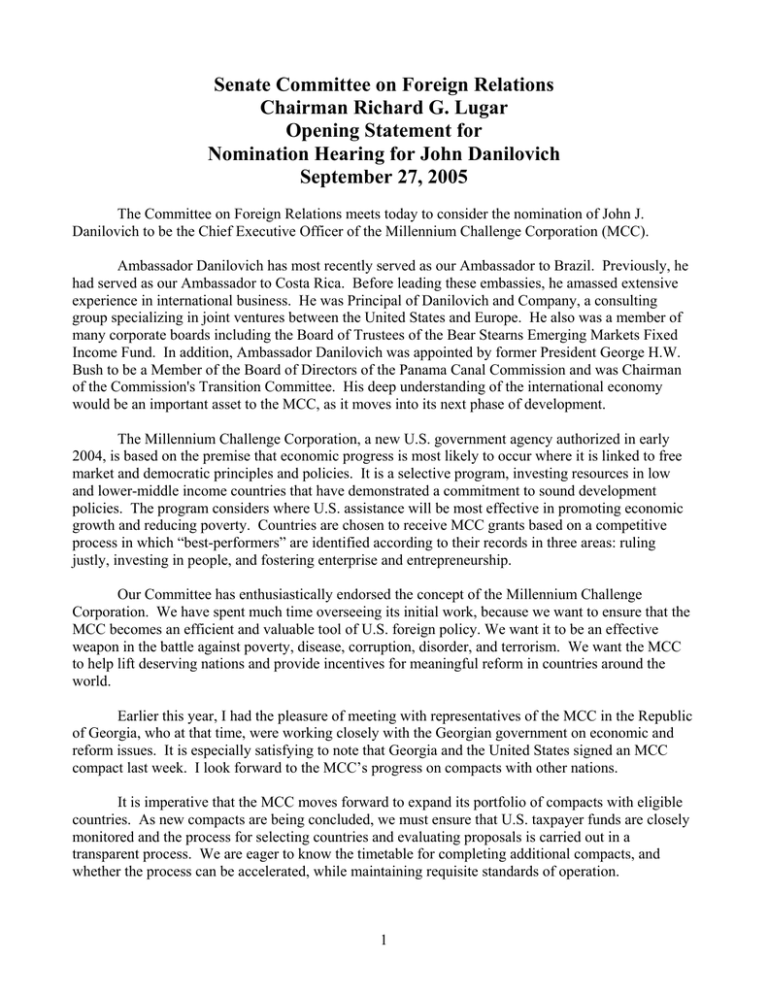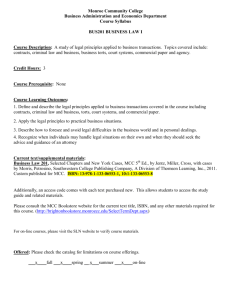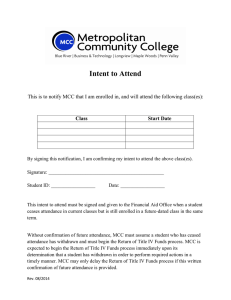Senate Committee on Foreign Relations Chairman Richard G. Lugar Opening Statement for
advertisement

Senate Committee on Foreign Relations Chairman Richard G. Lugar Opening Statement for Nomination Hearing for John Danilovich September 27, 2005 The Committee on Foreign Relations meets today to consider the nomination of John J. Danilovich to be the Chief Executive Officer of the Millennium Challenge Corporation (MCC). Ambassador Danilovich has most recently served as our Ambassador to Brazil. Previously, he had served as our Ambassador to Costa Rica. Before leading these embassies, he amassed extensive experience in international business. He was Principal of Danilovich and Company, a consulting group specializing in joint ventures between the United States and Europe. He also was a member of many corporate boards including the Board of Trustees of the Bear Stearns Emerging Markets Fixed Income Fund. In addition, Ambassador Danilovich was appointed by former President George H.W. Bush to be a Member of the Board of Directors of the Panama Canal Commission and was Chairman of the Commission's Transition Committee. His deep understanding of the international economy would be an important asset to the MCC, as it moves into its next phase of development. The Millennium Challenge Corporation, a new U.S. government agency authorized in early 2004, is based on the premise that economic progress is most likely to occur where it is linked to free market and democratic principles and policies. It is a selective program, investing resources in low and lower-middle income countries that have demonstrated a commitment to sound development policies. The program considers where U.S. assistance will be most effective in promoting economic growth and reducing poverty. Countries are chosen to receive MCC grants based on a competitive process in which “best-performers” are identified according to their records in three areas: ruling justly, investing in people, and fostering enterprise and entrepreneurship. Our Committee has enthusiastically endorsed the concept of the Millennium Challenge Corporation. We have spent much time overseeing its initial work, because we want to ensure that the MCC becomes an efficient and valuable tool of U.S. foreign policy. We want it to be an effective weapon in the battle against poverty, disease, corruption, disorder, and terrorism. We want the MCC to help lift deserving nations and provide incentives for meaningful reform in countries around the world. Earlier this year, I had the pleasure of meeting with representatives of the MCC in the Republic of Georgia, who at that time, were working closely with the Georgian government on economic and reform issues. It is especially satisfying to note that Georgia and the United States signed an MCC compact last week. I look forward to the MCC’s progress on compacts with other nations. It is imperative that the MCC moves forward to expand its portfolio of compacts with eligible countries. As new compacts are being concluded, we must ensure that U.S. taxpayer funds are closely monitored and the process for selecting countries and evaluating proposals is carried out in a transparent process. We are eager to know the timetable for completing additional compacts, and whether the process can be accelerated, while maintaining requisite standards of operation. 1 The enthusiasm members of Congress will have for the MCC in a difficult budgetary climate will depend greatly on the results the agency achieves and the efficiency of its activities. Today, we will be seeking the views of Ambassador Danilovich concerning his plans to ensure that the funds that Congress and the President have devoted to the MCC are used productively and efficiently. The MCC holds great promise for both participating countries and the United States. We hope that the MCC, working closely with Congress, can realize the original vision of President Bush to dramatically expand our ability to spur economic development and political progress throughout the world. I congratulate Ambassador Danilovich on his willingness to embrace this challenge, and we look forward to our discussion. ### 2


